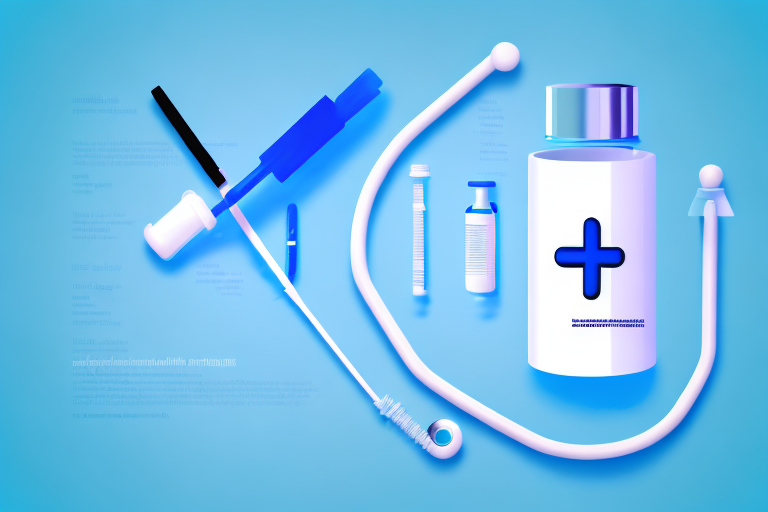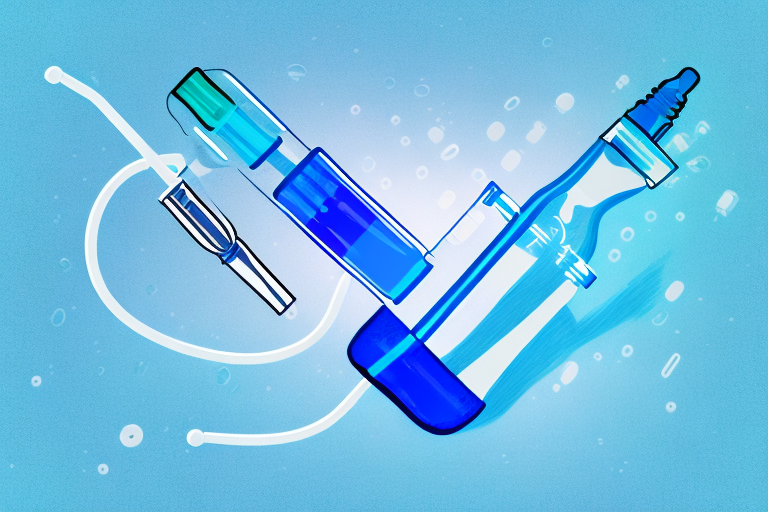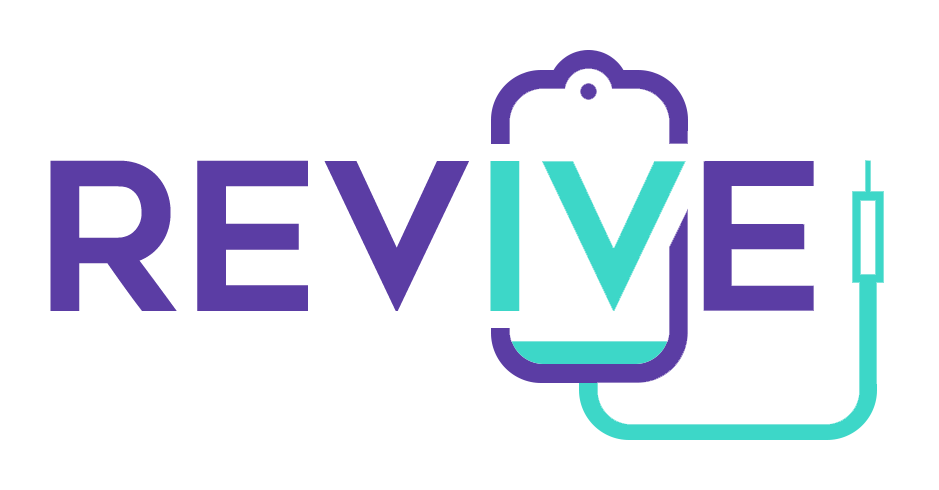What Is IV Therapy and How Can It Benefit You?

If you've been keeping up with the latest wellness trends, you may have heard of IV therapy. Intravenous (IV) therapy, also known as hydration therapy, has gained popularity over the last couple of years, drawing attention from athletes, celebrities, and wellness enthusiasts. But what exactly is IV therapy, and how can it benefit you? Let's take a closer look.
Understanding IV Therapy
IV therapy involves injecting fluids, vitamins, minerals, and other essential nutrients directly into your bloodstream. Unlike traditional methods of consuming fluids and nutrients, which are absorbed through the digestive system, IV therapy delivers them directly to your cells, bypassing the digestive system's potential barriers to nutrient absorption. This method allows for quick and efficient delivery of nutrients, making it a popular choice for people who want to enhance their health and wellness.
IV therapy has been used for decades in hospitals to treat a variety of conditions, including dehydration, nutrient deficiencies, and infections. However, in recent years, IV therapy has become increasingly popular among people who want to improve their overall health and wellness, as well as athletes who need to replenish fluids and nutrients after intense physical activity.
The Basics of Intravenous Therapy
The process for receiving IV therapy is straightforward. An IV catheter is inserted into a vein in your arm or hand and secured in place. The fluids and nutrients are then delivered through an IV infusion bag connected to the catheter. The process usually takes 30 minutes to an hour, depending on the type of therapy.
Before receiving IV therapy, it is important to consult with a healthcare professional to determine if it is right for you. IV therapy is generally safe, but it can have risks and side effects, such as infection, allergic reactions, and vein irritation.
Types of IV Therapy
IV therapy comes in various forms, each formulated to address particular health concerns or wellness goals. Some of the most popular types of IV therapy include:
- Hydration therapy: replenishes fluids and electrolytes to combat dehydration symptoms caused by intense physical activity or illness.
- Vitamin therapy: delivers high doses of vitamins to combat nutrient deficiencies and boost immune function.
- Nutrient therapy: delivers a mix of vitamins, minerals, and amino acids for overall wellness and general prevention.
- Detox therapy: helps to remove toxins from the body and support liver function.
- Weight loss therapy: delivers a combination of vitamins, minerals, and amino acids to boost metabolism and aid in weight loss.
IV therapy can be customized to meet individual needs and goals. A healthcare professional can help determine which type of therapy is best suited for you.
How IV Therapy Works
During the IV therapy session, the vitamins, minerals, and nutrients are delivered directly into your bloodstream. Since the nutrients are not being absorbed through the digestive system, you can receive higher doses, which can be more effective in correcting nutrient deficiencies and supporting immune function. IV therapy can also provide quick relief for various conditions such as migraines, hangovers, and jet lag, as nutrients are rapidly delivered to where they are needed most.
IV therapy is not a replacement for a healthy diet and lifestyle. It is important to continue to eat a balanced diet, exercise regularly, and get enough sleep to maintain optimal health and wellness.

Benefits of IV Therapy
IV therapy offers a host of benefits, including:
Improved Hydration
Dehydration can cause a wide range of symptoms, from headaches and fatigue to muscle cramps and dizziness. IV hydration therapy can quickly replenish fluids and electrolytes to alleviate these symptoms and improve overall hydration.
It is important to note that proper hydration is crucial for overall health and well-being. When you are dehydrated, your body is not able to function optimally, which can lead to a host of health problems. By choosing IV therapy, you can ensure that your body is getting the hydration it needs to function at its best.
Enhanced Immune Support
The vitamins and minerals in IV therapy can support immune function, helping your body fight off infections and illnesses. For example, high-dose vitamin C is a popular choice for combating the common cold and boosting immunity.
It is essential to have a strong immune system to protect your body from harmful pathogens and diseases. By choosing IV therapy, you are providing your body with the essential nutrients it needs to support a healthy immune system, which can help you avoid getting sick and speed up recovery if you do get sick.
Increased Energy Levels
IV therapy can boost energy levels by replenishing vital nutrients that your body needs to function correctly. B vitamins, in particular, can help reduce fatigue and provide a natural energy boost.
Many people struggle with low energy levels, which can impact their daily lives and overall well-being. By choosing IV therapy, you can give your body the nutrients it needs to combat fatigue and increase energy levels, allowing you to feel more alert and focused throughout the day.
Faster Recovery from Illness or Injury
IV therapy can speed up recovery time from illness or injury by delivering nutrients directly to the cells that need them most. Nutrient-rich IV infusions can also reduce inflammation and promote healing.
When you are sick or injured, your body needs extra support to heal and recover. IV therapy provides your body with the essential nutrients it needs to speed up the healing process and reduce inflammation, allowing you to recover more quickly and get back to your daily activities.
Customized Nutrient Infusions
IV therapy can be tailored to meet specific health needs and goals. A healthcare professional can create a customized infusion that includes specific vitamins, minerals, and amino acids to address individual concerns.
Everyone's body is different, and therefore, everyone's health needs are different. By choosing IV therapy, you can work with a healthcare professional to create a customized nutrient infusion that meets your specific health needs and goals. This personalized approach ensures that you are getting the nutrients your body needs to function at its best.

Common IV Therapy Treatments
IV therapy has become increasingly popular in recent years as a way to boost overall health and wellness. It involves the infusion of vitamins, minerals, and other nutrients directly into the bloodstream, bypassing the digestive system and allowing for maximum absorption.
Myers' Cocktail
The Myers' Cocktail is a well-known blend of vitamins and minerals, including vitamin C, magnesium, and B vitamins. This combination is designed to provide an overall wellness boost and support immune function, energy, and metabolism. It was originally developed by Dr. John Myers, a physician who used it to treat a variety of conditions, including chronic fatigue syndrome, fibromyalgia, and respiratory infections.
Many people who receive Myers' Cocktail infusions report feeling more energized and alert, with improved mood and cognitive function. Some also report relief from symptoms of chronic conditions such as arthritis and asthma.
High-Dose Vitamin C
High-dose vitamin C infusions are a popular choice for immune boosting and fighting off viral infections, such as the common cold or flu. Vitamin C is a powerful antioxidant that helps to protect cells from damage and supports immune function by stimulating the production of white blood cells.
Research has shown that high-dose vitamin C infusions can be effective in reducing the duration and severity of cold and flu symptoms, as well as improving overall immune function. Some studies have also suggested that vitamin C may have anti-cancer properties, although more research is needed to confirm this.
Glutathione Infusions
Glutathione is an antioxidant that helps your body remove toxins and free radicals. It is also important for immune function and can help to reduce inflammation throughout the body.
Glutathione infusions can help boost overall health and wellness, particularly for people with chronic conditions such as autoimmune disorders, chronic fatigue syndrome, and fibromyalgia. Some people also use glutathione infusions as a way to improve the appearance of their skin, as it can help to reduce the signs of aging and improve skin tone and texture.
Chelation Therapy
Chelation therapy involves infusing an amino acid called EDTA, which can bind to heavy metals and remove them from your body. People with heavy metal toxicity or cardiovascular disease may benefit from chelation therapy.
Chelation therapy has been used for many years as a way to treat lead poisoning and other heavy metal toxicities. It has also been studied as a treatment for cardiovascular disease, as some researchers believe that the buildup of heavy metals in the body can contribute to the development of heart disease.
While chelation therapy is generally considered safe, it can have some side effects, including nausea, vomiting, and headache. It is important to talk to your doctor before undergoing chelation therapy to determine if it is a safe and appropriate treatment for you.

Potential Risks and Side Effects
As with any medical treatment, IV therapy carries potential risks and side effects. However, it is important to note that the benefits of IV therapy often outweigh the risks for those who need it. Some possible complications include:
Infection and Inflammation
IV therapy involves puncturing the skin with a needle and exposing the body to foreign substances. While the risk of infection and inflammation is low, it is still a potential risk. In rare cases, this can lead to infections or inflammation. It is important to make sure that the IV insertion site is cleaned properly and monitored regularly to prevent any complications.
Air Embolism
If air enters your bloodstream during IV therapy, it can cause an air embolism, which can be potentially life-threatening. This can occur if the IV catheter is not inserted properly or if the tubing becomes disconnected. It is important to make sure that the IV is properly inserted and monitored throughout the treatment.
Overhydration
Receiving too many fluids through IV therapy can lead to overhydration and affect electrolyte balance, which can be dangerous. This is more common in individuals who have kidney or heart problems. It is important to monitor the amount of fluids being administered and adjust accordingly based on the patient's medical history and condition.
Allergic Reactions
In rare cases, people may experience an allergic reaction to the substances used in IV therapy. This can include medications, fluids, or other substances. It is important to inform the medical staff of any known allergies before starting IV therapy. If an allergic reaction occurs, treatment should be stopped immediately and the patient should be monitored closely.
Overall, IV therapy is a safe and effective treatment option for many medical conditions. However, it is important to be aware of the potential risks and side effects associated with this treatment and to discuss any concerns with your healthcare provider.
Who Can Benefit from IV Therapy?
IV therapy is a medical treatment that involves the administration of fluids, vitamins, minerals, and other nutrients directly into the bloodstream through an intravenous line. It has become increasingly popular in recent years due to its ability to provide quick relief for a variety of health concerns. Here are some of the people who can benefit from IV therapy:
Athletes and Fitness Enthusiasts
Athletes and fitness enthusiasts often push their bodies to the limit during intense workouts and competitions. This can lead to muscle fatigue, soreness, and even injury. IV therapy can help these individuals recover faster by providing the necessary nutrients and hydration to their bodies. It can also provide an extra boost of energy and stamina to help them perform at their best.
Individuals with Chronic Illnesses
People with chronic illnesses, such as Lyme disease, fibromyalgia, and chronic fatigue syndrome, often experience a range of symptoms that can be difficult to manage. IV therapy can help these individuals by providing targeted nutrients and medications that can alleviate symptoms and support overall health. It can also help to boost the immune system and improve energy levels.
People Experiencing Nutrient Deficiencies
Nutrient deficiencies can occur for a variety of reasons, including poor diet, malabsorption, and certain medical conditions. IV therapy can provide quick relief for people with nutrient deficiencies by delivering the necessary vitamins and minerals directly into the bloodstream. This can help to alleviate symptoms such as fatigue, weakness, and cognitive impairment.
Those Seeking General Wellness and Prevention
Even healthy individuals can benefit from IV therapy as a preventative measure to keep their bodies functioning optimally and support overall wellness. IV therapy can help to boost the immune system, improve energy levels, and even enhance the appearance of skin and hair. It can also provide a quick and effective way to rehydrate after a night of drinking or a long flight.
In conclusion, IV therapy is a versatile medical treatment that can benefit a wide range of individuals. Whether you are an athlete looking to improve performance, a chronic illness patient seeking symptom relief, or simply someone looking to maintain optimal health, IV therapy may be a valuable addition to your healthcare regimen.
How to Get Started with IV Therapy
Consult with a Healthcare Professional
Before considering IV therapy, it's essential to consult with a healthcare professional to ensure that it's safe for you and addresses your specific health concerns or wellness goals.
Choose a Reputable IV Therapy Provider
When choosing an IV therapy provider, research their credentials, read reviews, and ensure that they follow proper safety guidelines and protocols.
Prepare for Your First Session
Before your first IV therapy session, make sure you are well-hydrated, and have eaten a healthy meal. Wear comfortable clothing and be prepared to relax for the duration of the treatment.
Monitor Your Progress and Adjust as Needed
Keep track of your symptoms and how you feel after each IV therapy session. If you have any concerns or notice any side effects, consult with your healthcare professional and adjust your treatment plan if necessary.
Conclusion
IV therapy can offer numerous benefits for overall health and wellness and may be particularly helpful for people with chronic illnesses, nutrient deficiencies, or those seeking to enhance athletic performance or overall wellbeing. However, as with any medical treatment, it's essential to consult with a healthcare professional and choose a reputable provider to ensure your safety and achieve optimal results.










